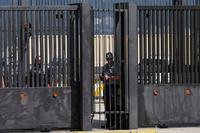More than 40 years after Congress torpedoed any hopes of service members being able to unionize, some Texas National Guard troops deployed on the U.S.-Mexico border aim to be the first troops to do just that after a recent federal court filing found the prohibition does not include those on state orders.
If they're successful, it could prove a flashpoint for the rights of the nation's 400,000 Guardsmen, who have been tasked with a long string of domestic missions during the pandemic, following their key role in the post-9/11 wars.
National Guard leaders are keeping their eye on the situation in Texas, unsure how they would respond if their own ranks were formally organized.
Read Next: 'Bad Paper' Discharges of Some Marines and Sailors to Get Second Look
The move to unionize is the culmination of a mission that has been plagued from the start by pay and discipline issues that, according to the soldiers looking to organize, reflect failed leadership.
Self harm, mental health and pay issues have run rampant, resulting in widespread alcohol abuse on the mission with numerous soldiers landing in jail.
At least six Texas Guardsmen are aligning with the Texas State Employees Union, with a formal meeting set for next week and recruitment efforts already underway to bolster their ranks. The service member heading that effort told Military.com they hope to get a seat at the table with senior leadership and elected officials to advocate for sending troops who are on the mission involuntarily home.
Up until last year, Texas' border operations had been relatively small and voluntary -- causing some Guardsmen who spoke to Military.com to suspect that the mobilization of 10,000 troops may be related to Gov. Greg Abbott's reelection bid.
"This is apolitical. It may come at a politically inconvenient time, but our motivations are apolitical," the Texas Guardsman leading the unionization effort told Military.com on the condition of anonymity to avoid retaliation. "At the end of the day, I know [the Guard] is going to see this as adversarial, and I wish it didn't have to be that way. We want to help resolve these issues; nobody wants to be at war with their own soldiers. I think this could turn into something that's helpful to soldiers that's not just anti-leadership. We're all on the same team."
Even if a union weren't able to argue for increased benefits, joining forces with state employees in Texas could, at a minimum, offer Guardsmen better access to information about benefits.
"It could connect them to state benefits that aren't being communicated to them. Health insurance is a big one. Some of the soldiers are under the impression they can only get workers' compensation," a Texas state legislature staffer and union member told Military.com. "They are eligible for state health insurance; they're just not being told about it. The union would be the most effective way of accessing those resources."
The prohibition on Guardsmen unionizing followed a post-Vietnam era labor battle. In 1977, the late Sen. Strom Thurmond, a South Carolina Republican, passed a measure banning military unionization after several European militaries started organizing. That followed a decision two years earlier by the American Federation of Government Employees, a labor union which today represents more than 670,000 federal employees, to admit service members.
Thurmond's bill passed through Congress with only two dissenting votes.
"There is no place in the armed forces for an organization that could come between a commander and his troops," Thurmond said at the time.
In January, the Justice Department agreed in a court filing that the law does not apply to Guardsmen on state orders, following a complaint from Connecticut labor unions asking a judge to lift the prohibition. Four unions, including Connecticut's police and fire union, argued that, unlike other public servants, Guardsmen have no labor organization that can advocate for them and the law's language applies only to troops on federal orders.
Abbott is ultimately in charge of the border mission in his state, being the commander in chief of Texas Guardsmen while they are in a state status, but Maj. Gen. Tracy Norris serves as the state's top military leader. Some Texas Guardsmen say problems with the mission are the result of Abbott ordering thousands of troops to move swiftly to the border before critical logistics were established. Others have painted Norris as an ineffective leader who has struggled with establishing the most basic support for the state's troops, or advocating on their behalf.
"If this mission is so bad it's leading [Guardsmen] to unionize, maybe Norris should resign," one senior Guard official told Military.com on the condition of anonymity to avoid retaliation. "This has been extremely poorly handled, and it isn't likely going away."
The senior official, however, said that Norris was in a difficult situation.
"This is the most complicated domestic mission, maybe in modern history. The scope of it is immense. How does any state do that? You either execute what the governor wants, or resign. The critique of her [Norris] and her team is -- what have they done to address these issues?"
Guard leaders interviewed pointed to state active-duty missions not being built for long-term operations. The infrastructure typically in place is meant to allow governors to mobilize troops quickly in emergencies for a few days, not for 12 months -- the length of most deployments to the Texas border. On state orders, troops are often paid less than when they are on federal orders, and they do not accrue any benefits.
The Guard is frequently deployed on federal orders on certain domestic missions, such as the pandemic, and when they are mobilized abroad, during which troops earn full pay, benefits and health care. In addition to Abbott's state-funded mission, the federal government has allocated a separate border mission of some 2,000 Guardsmen who are effectively performing the same duties -- but are being paid more and earning all the benefits associated with active duty.
If Guardsmen were to unionize, it could prove difficult not to trip over the federal ban. The Justice Department noted only that troops on state active duty could potentially unionize. However, Guardsmen on their typical weekend duties serve in a Title 32 capacity, which means they are paid by the federal government but under the command of the governor. In practice, there's little difference between Title 32 and state active duty, but the minor discrepancy of the state paying for one set of orders and the federal government backing another could have unions navigating a legal minefield. There would be times troops are on duty and part of a formal union, and other times they are not.
But if troops could thread that needle, it could lead to unprecedented ability to advocate for the needs of these service members. Traditionally, troops and veterans have had to rely on veteran organizations to lobby elected officials on issues such as securing health care for those affected by toxic exposure overseas. Troops being able to lobby for themselves could lead to a massive boost of legislative influence.
Union membership across the country has steadily fallen in recent decades. Yet several high-profile unionization efforts have kicked off in the past few years, including Capitol Hill staff, some Starbucks workers and Google employees. Strikes among workers at John Deere and Kellogg's have drawn attention to labor fights.
"Across the world, militaries have unionized, and that has helped give voices to the military," Will Attig, executive director of the Union Veterans Council, AFL-CIO, told Military.com. "This isn't some crazy idea; there is precedent. A modern military can benefit from troops being more involved. We could see a boost on advocating on issues like health care and sexual assault prevention."
-- Steve Beynon can be reached at Steve.Beynon@military.com. Follow him on Twitter @StevenBeynon.
Related: Texas Guardsmen Move to Unionize, Pointing to Troubled Border Mission












